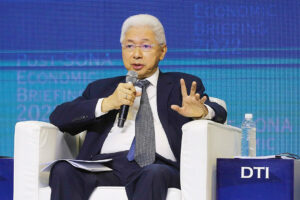THE Department of Trade and Industry (DTI) said export promotion will require greater funding to achieve the government’s aggressive goals for exporters.
Trade Secretary Alfredo E. Pascual told reporters on the sidelines of the launch of the Philippine Export Development Plan (PEDP) 2023-2028 in Taguig City that the extra funding will also go towards helping small companies find overseas markets.
“If promote exports (and) help micro, small, and medium enterprises (MSMEs) develop, (investments like these) will have a return,” Mr. Pascual said.
In the 2023 General Appropriations Act, the DTI had a budget of P6.3 billion, down from the P21.94 billion allocated in 2022.
Sergio R. Ortiz-Luis, Jr., Philippine Exporters Confederation, Inc. (Philexport), said separately that the DTI’s budget for 2024 should be doubled to fund foreign postings of trade promotion officers and participate in trade fairs.
Mr. Ortiz-Luis added that the DTI also requires more resources to hit the export targets set in the PEDP 2023-2028.
“That is the irony of it. The DTI does huge work in the export sector but it does not have the budget. The DTI should be given enough funding, and the worthwhile projects should also be funded,” Mr. Ortiz-Luis said.
“The DTI should not be one of the lowest-funded agencies since you want trade, you want price stabilization, you want the development of SMEs, but there is no funding,” he added.
Under the PEDP 2023-2028, the Philippines targets $126.8 billion worth of exports by 2023, $143.4 billion by 2024, $163.6 billion by 2025, $186.7 billion by 2026, $212.1 billion by 2027, and $240.5 billion by 2028.
Last year, exports rose 5.7% to $78.98 billion.
By 2028, electronics and electrical exports are projected to account for $106.4 billion of the total for all industries, followed by IT and Business Process Management with $63.2 billion, minerals $19.4 billion, agriculture $8.9 billion, transport products $6.8 billion, wearables, fashion accessories and travel goods $4.5 billion, chemicals $2.4 billion, and home furnishings $1.4 billion.
Mr. Pascual said the PEDP 2023-2028, in conjunction with the Regional Comprehensive Economic Partnership (RCEP), could help the Philippines realize its “untapped export potential.”
“Just to emphasize, RCEP utilization is an essential component in the successful implementation of the PEDP,” Mr. Pascual said.
The RCEP, which took effect in the Philippines on June 2, is a trade deal involving ASEAN, Australia, China, Japan, South Korea, and New Zealand.
According to the DTI, the PEDP places export development on the national agenda and seeks to troubleshoot obstacles to export competitiveness. The Philippines aspires to become a leading exporter of high-value products and services and seeks to help exporters become globally competitive. — Revin Mikhael D. Ochave

